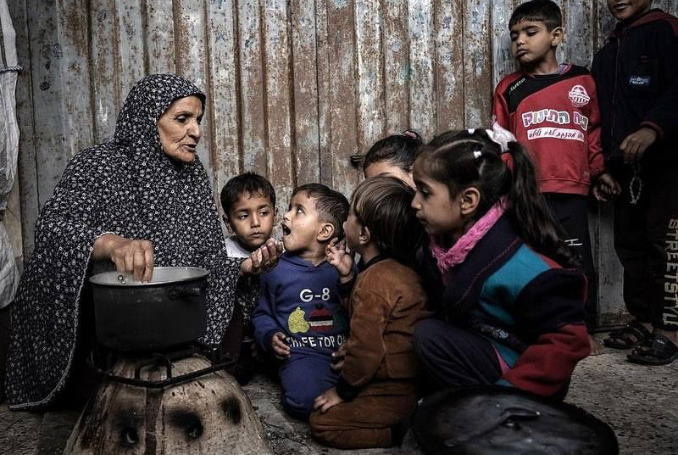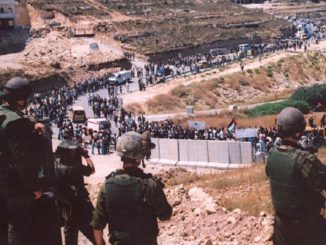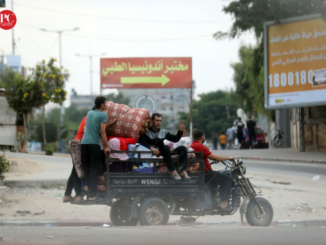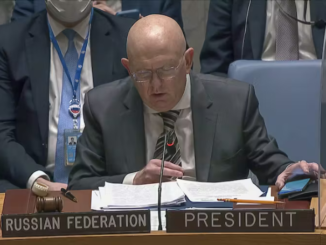
By Benay Blend
Shortly before the ceasefire, Israel continued to murder as many Palestinians as possible. This hardly bodes well for lasting peace.
In the past few weeks, there has been an outpouring of global support for the Palestinian struggle for liberation.
Samidoun, the Palestinian Prisoner Solidarity Network, has listed a calendar of events and actions around the world while the Answer Coalition maintains a list of US-based protests for Palestine.
As Ramzy Baroud and Romana Rubeo have noted, events of October 7 and beyond have ignited and united the struggle for liberation in the Global South, from black liberation movements to indigenous movements fighting for their rights.
On this National Day of Mourning (officially known as Thanksgiving Day), it is good to remember that none of these struggles are new, nor are their connections to Palestine only recent.
On Democracy Now’s Thanksgiving special, Lakota historian Nick Estes recalls that during the fight against the Dakota Access pipeline (2016-2017), there was a Palestinian flag hanging among the hundreds of tribal nation flags on flag row.
“We can see that settler colonialism in Israel – or in Palestine,” he concludes, “is really an extension of settler colonialism in North America.”
Yet, as Ajamu Baraka argues, the notion of the United States, and Israel for that matter, as a settler colonial state that practices systemic genocide has not yet been thoroughly integrated into the thinking of left or radical rhetoric in a way that makes this clear.
Perhaps this explains partly why it happens that among many of the chants at demonstrations as well as letters to public officials, memes on social media and the like, there has been an incessant call for “ceasefire now!”
But rarely does the call go beyond that to include the dismantling of the Zionist state, the right of Palestinians to return, and finally, a call for those responsible for the genocide, as well as those who aided and abetted, to be brought before the International Criminal Court (ICC) as war criminals.
Asking public officials to sign on to a ceasefire resolution is asking for the bare minimum in the face of genocide.
Moreover, it allows members of Congress to demonstrate that they favor humanitarian aid while at the same time some continue to open their statements with the obligatory denunciation of Hamas combined with repeating Israeli lies that have been debunked by even the mainstream media.
In a response to her constituents who contacted her regarding Gaza, Congresswoman Teresa Leger Fernadez, from my own state of New Mexico, opens with condemning Hamas’ “unspeakable evil and horrifying terrorist attacks” on October 7.
She then moves on to claim that Israel has a “responsibility to its people to remove Hamas from operational control” so that it cannot carry out its goals of “never-ending war” and “elimination of Jews in Israel.”
Leger Fernandez implies that the problems began on October 7, when in fact Palestinians have endured 75 years of brutality at the hands of the Zionist regime.
Claiming that Israel has a responsibility to remove Hamas from leadership only gives a greenlight to more carnage, and legitimates the notion of regime change, a move that has never worked well for the West. In this way, she whitewashes both the US and Israel’s imperialist policies that have resulted in more bloodshed.
Moreover, she repeats Israel’s falsehood that this is a war on Hamas, when more than 14,800 Palestinians have been killed, including those who live on the West Bank which is ostensibly governed by the Palestinian Authority (PA).
Finally, Israel has been carrying out its program of ethnic cleansing since 1948, long before there was an organization called Hamas.
In the end, she calls for a temporary ceasefire, a concession that activists have applauded her for while ignoring all the rest. Leger Fernandez also praised Biden’s commitment to send humanitarian aid, a move which does not offset his approval of military aid which has stoked the violence.
Her recommendation is for the outmoded two-state solution, which is unacceptable, even if it were feasible, because it imposes an endgame on another group of people without consulting what they might want to achieve.
As Baroud explains, the escalation of illegal settlements, the policy of ethnic cleansing, the violation of holy sites along with plans to annex even more territory make the two-state solution impossible, if it was ever a possibility in the first place.
In 1970, two years before his assassination by Mossad agents in Beirut, Ghassan Kanafani, writer and leader of the Popular Front for the Liberation of Palestine (PFLP) agreed to an interview with journalist Richard Carlton.
Therein he clearly defined the struggle as a liberation movement fighting for justice against a fascist state, a reality that continues to be ignored.
When asked why his organization would not engage in peace talks with Israelis, he replied, “You don’t mean exactly peace talks, you mean capitulation, surrendering.”
Kanafani called it a talk between “the sword and the neck,” as he had never seen a conversation between a colonialist state and a nationalist liberation movement that ended well.
To Kanafani, it was not possible to stop fighting, as the interviewer suggested that he does.
Palestinians had been living with starvation, death, and misery since 1948, so it made no sense to him to stop struggling for something better. “To us, to liberate our country, to have dignity, to have respect, to have our mere human rights,” he concluded, “is something as essential as life itself.”
Shortly before the ceasefire, Israel continued to murder as many Palestinians as possible. This hardly bodes well for lasting peace.
This means quite clearly that without ending the Israeli settler project with its apartheid laws, racialization of Palestinians and normalized violence, it will be ceasefire today and war tomorrow,” concludes Baraka, because Palestinians will continue to fight, as Kanafani said, for a cause that to them is just.
“What’s next?” asks human rights activist Khalil Abu Shammala. What’s next only leads to more questions, because no one yet knows the answer.
Nevertheless, he believes that Israel’s most recent war on Palestine will go down in history, because those who are dead are not numbers. “Each one of them constitutes a story of ambition, pain and hope.”
How the Zionist state is dismantled, and what comes next, is up to Palestinians on the ground. It is not the call of foreign governments, international activists, or anyone else who comes up with a solution.
In a video shared on the Facebook platform, Baroud spells this out succinctly.
“Palestinians know exactly what the solution is to settler-colonialism and apartheid: Resistance!” he contends. “And they are resisting. So can we please learn to listen.”

– Benay Blend earned her doctorate in American Studies from the University of New Mexico. Her scholarly works include Douglas Vakoch and Sam Mickey, Eds. (2017), “’Neither Homeland Nor Exile are Words’: ‘Situated Knowledge’ in the Works of Palestinian and Native American Writers”. She contributed this article to The Palestine Chronicle.







